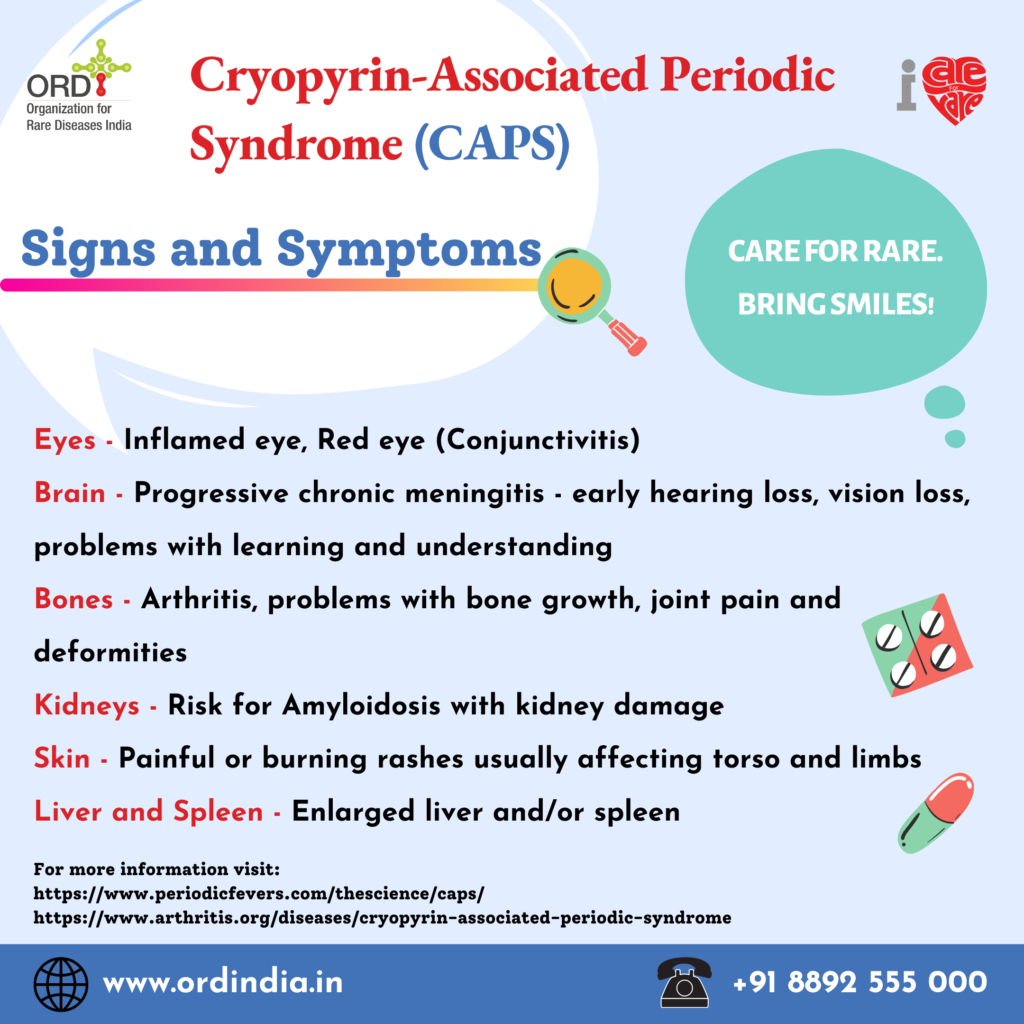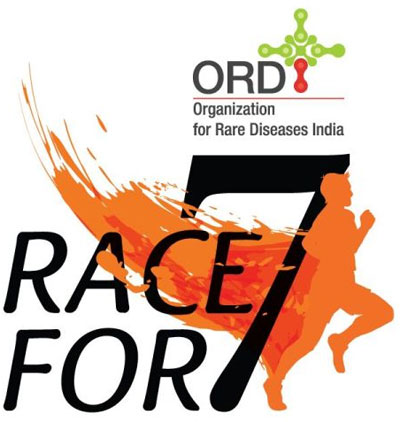Cryopyrin-associated periodic syndrome (CAPS) is a rare hereditary inflammatory disorder. CAPS results from a gain-of-function mutation of the NLRP3 gene coding for cryopyrin, which forms intracellular protein complexes known as inflammasomes. Defects of the inflammasomes lead to overproduction of interleukin-1, resulting in inflammatory symptoms and is listed under Autoinflammatory disorder.
Cryopyrin-associated periodic syndromes (CAPS) are three very rare diseases related to a defect in the same gene. The three diseases are:
- Neonatal onset multisystem inflammatory disease (NOMID).
- Muckle-Wells syndrome (MWS).
- Familial cold autoinflammatory syndrome(FCAS).
Signs and Symptoms:
Figure 1: General symptoms of Cryopyrin-Associated Periodic Syndrome (CAPS)
- The symptoms and severity of CAPS vary by disease.
- This disease is characterized by symptoms that come and go, and include Fever, rash, sore or red eyes, fatigue, muscle or joint pain and severe headaches with vomiting.
Types:
§ Neonatal Onset Multisystem Inflammatory Disease (NOMID)
The most severe of the CAPS, this disease usually starts after birth and causes fever with inflammation in multiple organs.
Early symptoms of NOMID may include a hive-like rash that doesn’t itch, headache, bulging eyes or blindness, hearing loss, repeated vomiting or joint pain and swelling.
§ Muckle-Wells Syndrome (MWS)
This disease is characterized by symptoms that come and go, and include rash, red eyes, joint pain and severe headaches with vomiting. Episodes last between one and three days. Hearing loss, which may be complete, often occurs by the teenage years.
§ Familial Cold Autoinflammatory Syndrome (FCAS)
In people with this disease, exposure to cold or other environmental triggers causes a hive-like rash. Other symptoms include fever, chills, nausea, extreme thirst, headache or joint pain.
Cause:
CAPS are caused by a gene mutation that results in a defect in a protein called cryopyrin. This protein plays an important role in controlling inflammation. CAPS are autosomal dominant diseases, meaning only one copy of the gene from one parent is needed to cause the disease. The gene can also mutate spontaneously during conception, causing the disease in the child.
How common is it?
CAP syndromes are extremely rare, affecting about one person in every one million people.
It is believed that there may be additional cases of CAPS that remain undiagnosed, or misdiagnosed.
Further to this, some patients present with symptoms of more than one CAPS condition, complicating the differential diagnosis of FCAS, MWS or NOMID.
Diagnosis:
Doctors who suspect CAPS based on a physical exam may use one or more of several tests to confirm the diagnosis. These include:
- Laboratory assessment – Acute-phase protein levels should be monitored, including C-reactive protein (CRP) and, serum amyloid A (SAA).
- Genetic testing – Sequencing the whole NLRP3gene is evidenced by missense mutations in exon 4 (G755R, G755A) and exon 6 (Y859C) that have been identified in CAPS patients. The currently available commercial test by GeneDx (Gaithersburg, MD) sequences exon 3.
- Skin biopsy of the rash – Histologic examination of affected skin can assist in confirming an early diagnosis of CAPS. A common characteristic feature is neutrophilic dermal infiltrate in the reticular dermis.
- Eye exam.
- Hearing test.
- Test on joint fluid obtained from a puncture in the lower spine.
- Magnetic resonance image of the brain and inner ears.
Treatment:
Research in recent years shows that biologic drugs that target interleukin-1 are effective for treating CAPS. These IL-1 inhibitors include anakinra, rilonacept and canakinumab. These treatments must be taken life-long but can allow children to lead near-normal lives.
Other treatments include physical therapy; splints to treat joint alignment; and nonsteroidal anti-inflammatory drugs (NSAIDs), corticosteroids or methotrexate to reduce symptoms. Surgery can correct joint deformities. Hearing aids may be needed for some children.
· Conventional Anti-inflammatories – Anti-inflammatories, immunosuppressants, and antihistamines
· Interleukin-1 Targeted Therapy – The identification of the NLRP3 gene responsible for FCAS and MWS and the finding that IL-1β production is increased in NOMID has created an important therapeutic target for CAPS. It can help prevent the development of systemic amyloidosis and lessen the potential for end-organ disease.
· Caspase-1 Targeted Therapy – Caspase-1 inhibitors act upstream in this IL-1β production pathway. The drug VX-765 (Vertex Pharmaceuticals, Cambridge, MA) is a powerful selective inhibitor of caspase-1.
We appreciate the efforts of Ms. Tisha Kalpeshbhai Desai and Ms. Shruti Mohanty, MSc. BMG, VIT, Vellore in curating the content for Cryopyrin-Associated Periodic Syndrome (CAPS)
Last updated: 8th September 2021
References:
- https://www.ncbi.nlm.nih.gov/pmc/articles/PMC3020304/
- https://en.wikipedia.org/wiki/Cryopyrin-associated_periodic_syndrome#Diagnosis
- https://www.periodicfevers.com/thescience/caps/
- https://www.rheumatology.org/I-Am-A/Patient-Caregiver/Diseases-Conditions/Cryopyrin-Associated-Autoinflammatory-Syndrome-CAPS-Pediatric
- https://www.arthritis.org/diseases/cryopyrin-associated-periodic-syndrome




